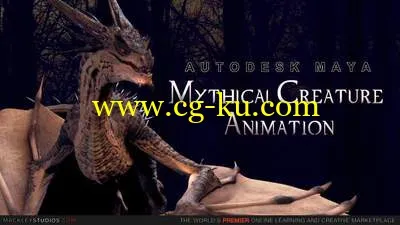
Duration 4h 39m Project Files Included MP4
Title: MackleyStudios – Autodesk Maya Mythical Creature Animation
Info:
Creature Animators are in demand. This course teaches you how to develop your own creature animations.
Chris Tedin presents the first in a series of creature animation and walks you through how to animate a dragon rig in Autodesk Maya.
I’m excited to present to you guys the first in a series of creature animation, specifically, Mythical Creature Animation. The demand for creature animators is growing and will continue to rise. As motion capture tends to take over a lot of the biped stop-animation, creature animation and animal animation is going to remain steady.
So we’re going to look at the dragon, and look at it with a combination of quadruped animation and winged characters. So we’ll start with the basic structure of the wing and how it operates. We’ll do some real basic studies by making ourselves a simple geometric object and look at the structure of the wing, animate, set key-frames, and set pose-to-pose animation. We’ll look at references, like large birds – a crane as an example – we’ll slow down the flight to make the size even larger and make it seem like a larger character. We’ll continue to look at those references and go back to the creature and use that to guide us in the discovery of the dragon’s animation.
From there, we’ll start with pose-to-pose, looking not at the timing, but the entire character’s poses, not just the wings, but the body, the tail, the head, and the feet. We’ll do overlapping animation. We’ll go over how the animation flows through the character, looking at the interpolation curves: getting all the character’s motion smooth where it needs to be smooth and getting it more dynamic where it needs to be dynamic. We’ll also look at arc-motion and different tools inside of Maya to guide arc-motion. With this, we’ll do an entire flight cycle that can be repeated and used inside of game animation, etc.
We’ll move from there on to a landing of a character, taking what we learned from the flight cycle and taking it onto a landing character, which is a lot more complex. Every pose is going to be different and there is no cycle that we can apply to every approach. We’re going to go over how the character lands – the physicality of the character. Not just the weight of the character but the way the muscle mass is pushing against the air and how the air reacts and responds and how this massive character can slow itself down to a landing… and the way all the other parts – the head and the tail and the feet – and how they all react to the ground plane so we can get that physicality and response to the ground-plane properly. For this process, we’ll be looking at all the details. Every little part. First, layering the animation once we do pose-to-pose, then getting the timing correct, then getting that ground-contact well-considered and well-thought-out and solving some simple problems like gimbal-locking. Always going back to that curve editor, making sure that the curves are smooth and tight where they need to be.
The timing is important to: is the character flapping at the right time, and what’s the thought-process of this dragon as he’s landing on the ground? What’s his next move? What’s he trying to accomplish? There’s this emotional impact of him trying to scare the audience. We’ll set the camera in a way that is most responsive to this dragon’s presence and get the right emotional reaction out of it.
I hope you like it. I had a lot of fun doing this series. I hope you have a lot of fun and enjoy the process. The rig is available for free, by the way. I give credit to the guy who rigged the character, so enjoy playing with this rig and enjoy dragon animation.
发布日期: 2017-02-28